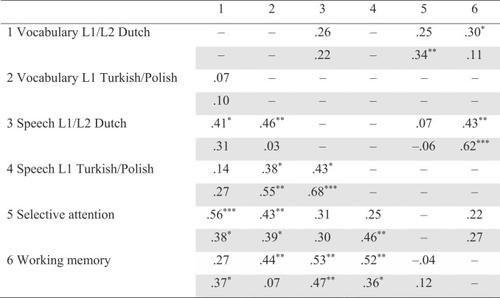当前位置:
X-MOL 学术
›
Res. Dev. Disabil.
›
论文详情
Our official English website, www.x-mol.net, welcomes your feedback! (Note: you will need to create a separate account there.)
Individual variation in bilingual vocabulary in preschoolers with developmental language disorder
Research in Developmental Disabilities ( IF 3.000 ) Pub Date : 2024-02-22 , DOI: 10.1016/j.ridd.2024.104695 Lisa Verbeek , Tijs Kleemans , Constance T.W.M. Vissers , Eliane Segers , Ludo Verhoeven
Research in Developmental Disabilities ( IF 3.000 ) Pub Date : 2024-02-22 , DOI: 10.1016/j.ridd.2024.104695 Lisa Verbeek , Tijs Kleemans , Constance T.W.M. Vissers , Eliane Segers , Ludo Verhoeven

|
It is unclear how speech production, selective attention, and phonological working memory are related to first- (L1) and second-language (L2) vocabularies in bilingual preschoolers with Developmental Language Disorder (DLD). To study individual variation in vocabularies in DLD bilingual preschoolers by (1) comparing them to typically developing (TD) bilingual, and TD and DLD monolingual peers; (2) differentially predicting L2 vocabulary; and (3) identifying and characterizing bilinguals’ L1/L2 vocabulary profiles. We measured the selective attention, working memory, and L1 Turkish/Polish (where applicable) and L1/L2 Dutch speech and vocabulary abilities of 31 DLD bilingual, 37 TD bilingual, and 61 DLD and 54 TD Dutch monolingual three-to-five year-olds. DLD bilinguals scored lower than TD bilinguals and TD/DLD monolinguals on all measures, except L2 vocabulary, where all bilinguals underperformed all monolinguals. Selective attention predicted Dutch vocabulary across groups. Three bilingual vocabulary profiles emerged: DLD bilinguals were less likely to be TD/DLD bilinguals with better attention more often had a , while those with poorer selective attention and L1 speech tended to be . These findings highlight the roles of L1 speech and selective attention, rather than L2 speech and working memory, in understanding bilingual vocabulary variation among DLD preschoolers.
中文翻译:

患有发展性语言障碍的学龄前儿童双语词汇的个体差异
目前尚不清楚患有发展性语言障碍 (DLD) 的双语学龄前儿童的言语产生、选择性注意和语音工作记忆与第一语言 (L1) 和第二语言 (L2) 词汇之间的关系。通过以下方式研究 DLD 双语学龄前儿童词汇量的个体差异:(1) 将他们与典型发展 (TD) 双语以及 TD 和 DLD 单语同龄人进行比较; (2) 差分预测L2词汇; (3) 识别和描述双语者的 L1/L2 词汇概况。我们测量了 31 名 DLD 双语、37 名 TD 双语、61 名 DLD 和 54 名 TD 荷兰语单语三到五年学生的选择性注意力、工作记忆、L1 土耳其语/波兰语(如适用)和 L1/L2 荷兰语言语和词汇能力。 -老人。 DLD 双语者在所有指标上的得分均低于 TD 双语者和 TD/DLD 单语者,但 L2 词汇除外,所有双语者的表现均低于所有单语者。选择性注意力预测了不同群体的荷兰语词汇量。出现了三种双语词汇概况:DLD 双语者不太可能是 TD/DLD 双语者,注意力较好的人通常有 ,而那些选择性注意力和 L1 言语较差的人往往是 。这些发现强调了第一语言言语和选择性注意(而不是第二语言言语和工作记忆)在理解 DLD 学龄前儿童双语词汇变化方面的作用。
更新日期:2024-02-22
中文翻译:

患有发展性语言障碍的学龄前儿童双语词汇的个体差异
目前尚不清楚患有发展性语言障碍 (DLD) 的双语学龄前儿童的言语产生、选择性注意和语音工作记忆与第一语言 (L1) 和第二语言 (L2) 词汇之间的关系。通过以下方式研究 DLD 双语学龄前儿童词汇量的个体差异:(1) 将他们与典型发展 (TD) 双语以及 TD 和 DLD 单语同龄人进行比较; (2) 差分预测L2词汇; (3) 识别和描述双语者的 L1/L2 词汇概况。我们测量了 31 名 DLD 双语、37 名 TD 双语、61 名 DLD 和 54 名 TD 荷兰语单语三到五年学生的选择性注意力、工作记忆、L1 土耳其语/波兰语(如适用)和 L1/L2 荷兰语言语和词汇能力。 -老人。 DLD 双语者在所有指标上的得分均低于 TD 双语者和 TD/DLD 单语者,但 L2 词汇除外,所有双语者的表现均低于所有单语者。选择性注意力预测了不同群体的荷兰语词汇量。出现了三种双语词汇概况:DLD 双语者不太可能是 TD/DLD 双语者,注意力较好的人通常有 ,而那些选择性注意力和 L1 言语较差的人往往是 。这些发现强调了第一语言言语和选择性注意(而不是第二语言言语和工作记忆)在理解 DLD 学龄前儿童双语词汇变化方面的作用。



























 京公网安备 11010802027423号
京公网安备 11010802027423号